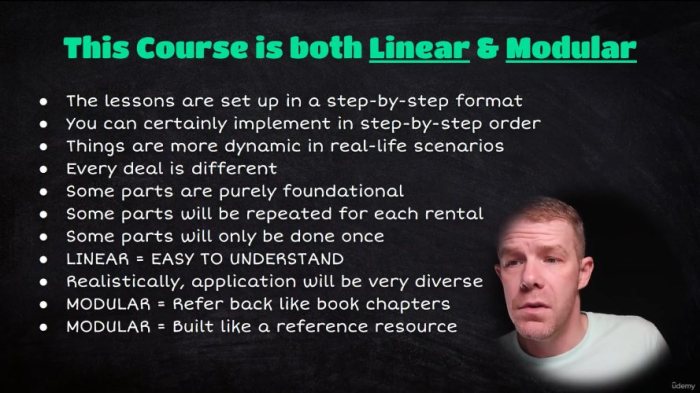IT Courses Online for Beginners Your Path to Tech Success

IT Courses Online for Beginners: Your Path to Tech Success opens a gateway to a world of exciting opportunities. The digital age demands skilled IT professionals, and this course provides a solid foundation for aspiring tech enthusiasts. From web development to cybersecurity, data analysis, and programming, these online courses offer a comprehensive introduction to the field, empowering beginners with valuable knowledge and skills. Whether you’re looking to switch careers, enhance your current skills, or simply explore the world of technology, these courses are designed to cater to your individual needs and aspirations.
The demand for IT professionals is rapidly growing, making it an attractive career path with promising prospects. Online courses offer a flexible and accessible way to learn at your own pace, making it convenient for individuals with busy schedules or limited access to traditional education. These courses are taught by industry experts, ensuring you receive high-quality instruction and practical knowledge. The skills you gain will be applicable across various industries, opening doors to a wide range of career possibilities.
Introduction to IT Courses
The world of technology is constantly evolving, and with it, the demand for skilled IT professionals is soaring. Whether you’re a complete beginner or have some prior experience, pursuing IT courses can open doors to exciting career opportunities and a future-proof skillset.
Benefits of Pursuing IT Courses
IT courses offer a wide range of benefits for beginners, including:
- High Job Demand: The IT industry is experiencing a significant talent shortage, making it a lucrative field to enter. According to the U.S. Bureau of Labor Statistics, employment of computer and information technology occupations is projected to grow 13% from 2020 to 2030, much faster than the average for all occupations.
- Competitive Salaries: IT professionals command competitive salaries, often exceeding those in other industries. For example, the median annual salary for software developers was $110,140 in May 2021, according to the U.S. Bureau of Labor Statistics.
- Flexibility and Remote Work Opportunities: Many IT roles offer flexibility and remote work options, allowing you to work from anywhere with an internet connection.
- Constant Learning and Growth: The IT field is constantly evolving, requiring professionals to stay updated with the latest technologies. This constant learning environment keeps your skills sharp and allows you to explore new areas of interest.
Career Paths in IT
IT courses can lead to a variety of career paths, including:
- Software Developer: Software developers create and maintain software applications for computers and mobile devices.
- Web Developer: Web developers design and build websites and web applications.
- Database Administrator: Database administrators manage and maintain databases, ensuring data integrity and security.
- Network Administrator: Network administrators manage and maintain computer networks, ensuring smooth operation and security.
- Cybersecurity Analyst: Cybersecurity analysts protect computer systems and networks from cyber threats.
- Data Analyst: Data analysts collect, analyze, and interpret data to provide insights and recommendations.
- IT Support Specialist: IT support specialists provide technical support to users of computer systems and software.
Types of IT Courses for Beginners

Starting your journey in the world of IT can seem overwhelming, but there are numerous beginner-friendly courses designed to equip you with the fundamental skills needed to thrive in this dynamic field. These courses provide a solid foundation, opening doors to various career paths within the IT industry.
Web Development
Web development encompasses the creation and maintenance of websites. It involves a combination of programming languages, design principles, and user experience considerations.
- Front-end development focuses on the visual aspects of a website, what users directly interact with. This includes using languages like HTML, CSS, and JavaScript to build the website’s layout, style, and interactive elements. For example, a front-end developer would be responsible for creating the visually appealing design of an e-commerce website, ensuring a smooth user experience for browsing products and making purchases.
- Back-end development deals with the server-side logic and database interactions that power a website. This involves languages like Python, Java, or Ruby to handle data processing, user authentication, and other server-side functionalities. For instance, a back-end developer would build the system that processes user registration data, manages product inventory, and ensures secure transactions on an e-commerce website.
Cybersecurity, It courses online for beginners
Cybersecurity courses teach you how to protect computer systems and networks from cyber threats. These courses cover topics like:
- Network security: Understanding how to secure networks from unauthorized access and data breaches. This involves implementing firewalls, intrusion detection systems, and other security measures to protect sensitive information. For example, a cybersecurity professional might analyze network traffic to identify and block malicious activities, ensuring the integrity of a company’s network.
- Operating system security: Learning how to secure operating systems like Windows or Linux from malware and vulnerabilities. This involves configuring security settings, installing security updates, and implementing best practices to prevent unauthorized access and data breaches. For instance, a cybersecurity professional might configure security policies on a company’s servers to prevent unauthorized access and ensure data integrity.
- Ethical hacking: Gaining a practical understanding of hacking techniques to identify and exploit vulnerabilities in systems. This knowledge helps cybersecurity professionals develop strategies to protect systems from real-world attacks. For example, an ethical hacker might attempt to penetrate a company’s network to identify security weaknesses, allowing them to implement measures to prevent actual attacks.
Data Analysis
Data analysis courses teach you how to extract insights from data using various tools and techniques.
- Data cleaning and preparation: Learning how to clean and prepare raw data for analysis. This involves identifying and correcting errors, handling missing values, and transforming data into a usable format. For instance, a data analyst might clean a dataset of customer purchase records, removing duplicates and correcting inconsistent entries to ensure accurate analysis.
- Statistical analysis: Applying statistical methods to analyze data and draw meaningful conclusions. This involves using statistical software packages like R or Python to perform hypothesis testing, regression analysis, and other statistical techniques. For example, a data analyst might analyze customer purchase data using statistical methods to identify trends and patterns, providing insights into customer behavior.
- Data visualization: Presenting data in a clear and concise way using charts, graphs, and other visualization techniques. This involves using tools like Tableau or Power BI to create compelling visualizations that effectively communicate insights from data. For example, a data analyst might create a dashboard visualizing key performance indicators (KPIs) for a business, providing a clear overview of its performance.
Programming
Programming courses introduce you to the fundamental concepts of programming, enabling you to create software applications.
- Basic programming concepts: Learning about variables, data types, operators, control flow, and functions. This provides a solid foundation for understanding how programs work and how to write code effectively. For example, a beginner programmer might learn how to write a program that calculates the average of a set of numbers, applying basic programming concepts like variables, operators, and loops.
- Object-oriented programming: Understanding how to design and develop software using objects, classes, and inheritance. This approach promotes code reusability and modularity, making it easier to manage complex software projects. For example, a programmer might use object-oriented programming concepts to create a program that simulates a bank account, defining classes for accounts, transactions, and customers, allowing for efficient code organization and reuse.
- Specific programming languages: Learning the syntax and features of popular programming languages like Python, Java, C++, or JavaScript. This allows you to build specific types of applications and work with different software development environments. For example, a programmer might learn Python to develop web applications or data analysis tools, while Java might be used for building enterprise-level software systems.
Network Administration
Network administration courses teach you how to manage and maintain computer networks.
- Network fundamentals: Understanding the basics of networking, including network protocols, topologies, and hardware components. This provides a foundation for understanding how networks function and how to troubleshoot common issues. For example, a network administrator might learn about TCP/IP, a fundamental network protocol, to understand how data is transmitted across networks.
- Network security: Implementing security measures to protect networks from unauthorized access and cyber threats. This involves configuring firewalls, intrusion detection systems, and other security tools to ensure network security. For example, a network administrator might configure a firewall to block unauthorized access to a company’s internal network, protecting sensitive data from external threats.
- Network troubleshooting: Learning how to diagnose and resolve network problems. This involves using network monitoring tools, analyzing network traffic, and applying troubleshooting techniques to identify and fix network issues. For example, a network administrator might use a network monitoring tool to identify slow network performance, troubleshoot the issue, and optimize network traffic flow.
Finding the Right Online Course: It Courses Online For Beginners
With so many IT courses available online, choosing the right one can feel overwhelming. To make the best decision, consider several factors that align with your learning style, career goals, and budget.
Factors to Consider
When selecting an online IT course, it’s crucial to consider several factors to ensure a successful and rewarding learning experience.
- Learning Style: Identify your preferred learning style. Do you learn best through hands-on activities, lectures, or interactive exercises? Some platforms offer courses that cater to different learning styles. For instance, Coursera offers courses with video lectures, quizzes, and hands-on projects, while Skillshare focuses on project-based learning.
- Career Goals: Determine your career aspirations. Are you looking to gain new skills for your current job, switch careers, or prepare for a specific certification? Choose courses that align with your career goals and provide relevant skills. For example, if you aim to become a web developer, courses on HTML, CSS, and JavaScript would be beneficial.
- Course Duration and Cost: Consider the time commitment and cost involved. Some courses are short and affordable, while others are more extensive and expensive. Choose a course that fits your schedule and budget. Platforms like Udemy often offer discounted courses, while edX offers a mix of free and paid courses.
- Instructor Experience and Reputation: Research the instructor’s experience and reputation. Look for instructors with relevant industry experience and positive reviews from past students. This ensures you’re learning from qualified professionals. You can often find instructor profiles and reviews on online learning platforms.
Comparing Online Learning Platforms
To help you navigate the diverse landscape of online learning platforms, here’s a table comparing popular options like Coursera, Udemy, edX, and Skillshare.
| Platform | Focus | Course Types | Pricing | Certifications |
|---|---|---|---|---|
| Coursera | University-level courses | Specializations, individual courses | Free (audit) or paid | Yes |
| Udemy | Wide range of courses | Technical, business, creative | Pay-per-course | Some courses offer certifications |
| edX | University-level courses | MicroMasters, XSeries, individual courses | Free (audit) or paid | Yes |
| Skillshare | Creative and business skills | Project-based learning | Subscription-based | No |
Essential Skills for IT Beginners
While technical knowledge is crucial, certain fundamental skills are equally important for success in the IT field. These skills are transferable across various IT roles and can help you navigate the ever-evolving tech landscape.
Problem-Solving
Problem-solving is the core of IT. From troubleshooting software glitches to optimizing network performance, IT professionals are constantly faced with challenges that require analytical thinking and creative solutions.
- Identifying the root cause: Analyzing error messages, logs, and system behavior to pinpoint the source of a problem. For example, a website crashing could be due to a server overload, a corrupted database, or a faulty code snippet.
- Developing a plan: Breaking down complex problems into smaller, manageable steps. This could involve researching potential solutions, testing different approaches, and documenting the process.
- Implementing solutions: Applying knowledge and technical skills to fix the issue. This might involve updating software, configuring settings, or writing custom code.
- Evaluating the outcome: Verifying that the solution has resolved the problem and assessing its effectiveness.
Critical Thinking
Critical thinking is essential for making informed decisions and evaluating information. In IT, it helps you analyze data, assess risks, and make sound judgments.
- Evaluating information: Distinguishing between reliable and unreliable sources, understanding the context of data, and identifying biases.
- Analyzing complex systems: Breaking down complex systems into their components, understanding their interactions, and identifying potential vulnerabilities.
- Developing innovative solutions: Thinking outside the box to find creative solutions to challenging problems.
Communication
Effective communication is crucial for collaboration, knowledge sharing, and client interaction. In IT, it involves clearly explaining technical concepts to both technical and non-technical audiences.
- Explaining technical concepts: Using clear and concise language to explain complex technical topics to colleagues, clients, or end-users.
- Active listening: Understanding the needs and concerns of others and asking clarifying questions.
- Documenting work: Writing clear and concise documentation for procedures, code, or projects.
Teamwork
IT projects often involve collaboration with other professionals, requiring teamwork and effective communication.
- Collaboration: Working effectively with colleagues to achieve common goals.
- Sharing knowledge: Contributing to the team’s knowledge base and learning from others.
- Conflict resolution: Addressing disagreements constructively and finding mutually beneficial solutions.
Adaptability
The IT field is constantly evolving, requiring professionals to be adaptable and embrace new technologies.
- Learning new technologies: Staying updated with the latest trends and technologies through continuous learning and professional development.
- Problem-solving in new environments: Applying existing knowledge and skills to new challenges and adapting to changing circumstances.
- Embracing change: Being open to new ideas and approaches, and adapting to changing work environments.
Resources and Tools for Beginners

Navigating the world of IT can feel overwhelming at first, but there are plenty of resources available to help you learn and grow. These resources can provide you with the knowledge, skills, and support you need to succeed in your IT journey.
- Online Communities and Forums: Online communities and forums offer a valuable platform for connecting with other IT enthusiasts, asking questions, and seeking advice. You can find communities dedicated to specific technologies, programming languages, or general IT topics.
- Free Online Courses and Tutorials: Numerous websites offer free online courses and tutorials that cover a wide range of IT topics, from basic computer skills to advanced programming concepts. These platforms provide a structured learning experience, often with interactive exercises and assessments.
- IT Books and Articles: Books and articles are excellent resources for in-depth knowledge and practical guidance. You can find books covering specific technologies, programming languages, or broader IT concepts. Online articles provide concise explanations and updates on emerging technologies.
- Practice Projects and Coding Challenges: Hands-on experience is crucial for mastering IT skills. Practice projects and coding challenges allow you to apply your knowledge and develop practical skills. Many websites offer curated challenges and projects that cater to different skill levels.
Online Communities and Forums
Online communities and forums provide a supportive environment for beginners to learn from experienced IT professionals and connect with peers.
- Reddit: Reddit hosts various subreddits dedicated to IT topics, such as r/learnprogramming, r/sysadmin, and r/networking. These subreddits offer a platform for asking questions, sharing knowledge, and participating in discussions.
- Stack Overflow: Stack Overflow is a question-and-answer website focused on programming and software development. It’s a valuable resource for finding solutions to coding problems and getting help from experienced developers.
- GitHub: GitHub is a platform for hosting and collaborating on software projects. It’s a great place to explore open-source projects, contribute to existing code, and connect with other developers.
Free Online Courses and Tutorials
Free online courses and tutorials offer a structured and accessible way to learn IT skills. These platforms provide a flexible learning environment, allowing you to study at your own pace and convenience.
- Khan Academy: Khan Academy offers a wide range of free courses in computer science, programming, and other IT-related subjects.
- Codecademy: Codecademy provides interactive courses in popular programming languages, including Python, JavaScript, and HTML.
- Coursera: Coursera offers free courses and specializations from top universities and institutions. You can find courses in various IT fields, such as cybersecurity, data science, and software engineering.
- edX: edX is another platform that offers free courses from leading universities. It provides a wide range of IT-related courses, including computer science, software development, and network security.
IT Books and Articles
IT books and articles provide in-depth knowledge and practical guidance on specific technologies, programming languages, or broader IT concepts.
- O’Reilly Media: O’Reilly Media publishes a wide range of IT books and articles covering various topics, from programming languages to software development methodologies.
- Packt Publishing: Packt Publishing offers books and articles on various IT topics, including web development, data science, and cybersecurity.
- TechRepublic: TechRepublic provides articles and news on IT trends, technologies, and best practices. It’s a valuable resource for staying updated on the latest developments in the IT industry.
Practice Projects and Coding Challenges
Practice projects and coding challenges allow you to apply your knowledge and develop practical skills. They provide a hands-on learning experience that complements theoretical knowledge.
- Project Euler: Project Euler offers a collection of mathematical and computational problems that can be solved using programming skills.
- HackerRank: HackerRank provides a platform for practicing coding skills through a variety of challenges and competitions.
- LeetCode: LeetCode is a platform for practicing coding interview questions and algorithms. It’s a valuable resource for aspiring software engineers.
Building a Portfolio and Networking
In the competitive world of IT, showcasing your skills and experience is crucial. Building a strong portfolio and networking with other professionals can significantly enhance your career prospects.
Creating a Compelling Portfolio
A portfolio serves as a visual representation of your abilities, demonstrating your skills and accomplishments to potential employers.
- Project Examples: Include projects you’ve worked on, whether personal or professional. Showcase your problem-solving skills, technical expertise, and creativity. Consider highlighting projects that demonstrate your proficiency in specific programming languages, frameworks, or tools.
- Certifications: Highlighting industry-recognized certifications demonstrates your commitment to professional development and validates your knowledge. Include relevant certifications like CompTIA A+, Cisco CCNA, or Microsoft Azure Fundamentals, which can enhance your credibility.
- Personal Website or Blog: Creating a personal website or blog allows you to showcase your skills, share your knowledge, and engage with the IT community. You can use this platform to publish articles, tutorials, or project details, demonstrating your expertise and thought leadership.
Benefits of Networking
Networking with other IT professionals provides valuable opportunities for professional growth and career advancement.
- Access to Job Opportunities: Networking can open doors to job opportunities that might not be publicly advertised. Connecting with individuals in your field can provide insights into potential job openings or lead to referrals.
- Knowledge Sharing and Collaboration: Networking allows you to learn from others, gain valuable insights, and share your knowledge. Collaboration with other professionals can lead to new ideas, problem-solving strategies, and professional growth.
- Mentorship and Guidance: Networking can connect you with experienced professionals who can provide mentorship and guidance. Seeking advice from seasoned individuals can help you navigate your career path and overcome challenges.
Career Advancement in IT

Completing beginner IT courses is just the first step on a rewarding journey in the tech world. These courses equip you with fundamental knowledge and skills, opening doors to a diverse range of IT careers. With dedication and strategic planning, you can progress through various levels and specialize in areas that align with your interests and goals.
Career Paths in IT
After completing beginner IT courses, you can explore different career paths within the IT industry. These paths offer diverse opportunities for growth and specialization.
- Software Development: This path involves creating, designing, and maintaining software applications. It includes roles like software developer, web developer, mobile app developer, and game developer.
- Cybersecurity: This field focuses on protecting computer systems and networks from cyber threats. It offers roles like security analyst, penetration tester, ethical hacker, and cybersecurity engineer.
- Network Administration: This path involves managing and maintaining computer networks, ensuring their smooth operation and security. It includes roles like network administrator, network engineer, and systems administrator.
- Database Administration: This path focuses on managing and maintaining databases, ensuring data integrity, security, and performance. It includes roles like database administrator, data analyst, and data scientist.
- IT Support: This path involves providing technical support to users, resolving technical issues, and troubleshooting computer problems. It includes roles like help desk technician, IT support specialist, and technical support engineer.
Entry-Level IT Jobs
Beginner IT courses prepare you for entry-level roles that offer valuable experience and a stepping stone to higher positions. These roles provide hands-on experience and a chance to learn from experienced professionals.
- Help Desk Technician: This role involves providing first-line technical support to users over phone, email, or chat. They troubleshoot common issues, answer questions, and guide users through basic software and hardware problems.
- IT Support Specialist: This role involves providing technical support to users, troubleshooting more complex issues, and assisting with network connectivity, software installation, and hardware maintenance.
- Junior Software Developer: This role involves working under the supervision of senior developers, assisting with coding tasks, writing simple code modules, and testing software applications.
- Network Technician: This role involves installing, configuring, and maintaining network infrastructure, including routers, switches, and cabling. They also troubleshoot network connectivity issues and ensure network security.
- Database Administrator Assistant: This role involves assisting senior database administrators with tasks like data entry, data backup, and running database queries. They also learn about database management principles and security practices.
Strategies for Advancement in IT
To advance your career in IT, you need to continuously learn, develop new skills, and stay relevant in the ever-evolving tech landscape.
Continuing Education
Continuing education is crucial for staying updated with the latest technologies and trends in IT. It involves pursuing additional courses, workshops, and certifications to enhance your skills and knowledge.
- Online Courses: Online platforms like Coursera, Udemy, and edX offer a wide range of IT courses covering various specializations and skill levels. These courses provide flexible learning options and can be tailored to your specific career goals.
- Bootcamps: IT bootcamps offer intensive, hands-on training programs that equip you with practical skills and prepare you for specific IT roles. They provide a fast-paced learning environment and often lead to job placement assistance.
- University Programs: Many universities offer undergraduate and graduate programs in IT, providing in-depth knowledge and specialized skills. These programs can lead to advanced career opportunities and higher earning potential.
Professional Certifications
Professional certifications demonstrate your expertise and commitment to a specific area of IT. They validate your skills and knowledge, making you a more competitive candidate in the job market.
- CompTIA Certifications: CompTIA offers a range of certifications covering various IT domains, including networking, security, and cloud computing. These certifications are widely recognized and valued by employers.
- Microsoft Certifications: Microsoft offers certifications for various software products and technologies, including Windows, Azure, and Office 365. These certifications demonstrate proficiency in Microsoft technologies and can enhance your career prospects.
- Cisco Certifications: Cisco offers certifications for networking technologies, including routing, switching, and security. These certifications are highly sought after in the networking field and can lead to advanced roles.
Industry Experience
Gaining practical experience in the IT industry is essential for career advancement. You can build experience through internships, volunteer work, personal projects, and contributing to open-source projects.
- Internships: Internships provide valuable hands-on experience in a real-world IT environment. They allow you to apply your skills, learn from experienced professionals, and build a professional network.
- Volunteer Work: Volunteering for IT-related projects or organizations can provide practical experience and networking opportunities. It allows you to contribute to real-world projects and gain valuable skills.
- Personal Projects: Creating personal projects, such as building websites, developing mobile apps, or setting up a home network, can demonstrate your skills and creativity. These projects can be included in your portfolio and showcased to potential employers.
- Open-Source Contributions: Contributing to open-source projects can provide exposure to real-world codebases, collaboration with experienced developers, and a chance to improve your coding skills.
Embarking on your IT journey with online courses is a rewarding experience that empowers you with the knowledge and skills needed to succeed in the digital age. By carefully choosing the right course, developing essential skills, and building a strong portfolio, you can set yourself up for a fulfilling and successful career in the dynamic world of technology. Remember to leverage available resources, network with other professionals, and stay updated on the latest advancements to continue your growth and thrive in this exciting field.
Quick FAQs
What are the prerequisites for taking IT courses online?
Most beginner IT courses don’t require prior experience. However, basic computer literacy and a willingness to learn are essential. Specific courses may have additional prerequisites listed in their descriptions.
How long does it take to complete an IT course online?
Course duration varies depending on the chosen course and learning platform. Some courses can be completed within a few weeks, while others may take several months. You can find this information in the course description.
Are there any job opportunities after completing beginner IT courses?
Yes, completing beginner IT courses can open doors to entry-level positions like Help Desk Technician, Junior Web Developer, or Data Entry Specialist. The specific job opportunities depend on the skills you acquire and the industry you choose to focus on.
IT courses online for beginners are a great way to learn new skills and advance your career. They offer flexibility and affordability, allowing you to learn at your own pace. While learning about IT, you might also need to consider securing car insurance, especially if you’re planning to drive to classes or work. Finding the right car insurance policy can be tricky, but there are resources like bristol car insurance that can help you compare quotes and find the best deal.
Once you have your insurance sorted, you can focus on mastering those IT skills and building a successful future.
Learning new skills online can be a great way to boost your career prospects. Whether you’re interested in web development, data analysis, or even learning how to code, there are plenty of resources available for beginners. It’s important to remember that driving without a license is illegal, and it’s also essential to have car insurance, even if you’re not driving, as you can still be held liable for accidents.
You can find out more about getting car insurance without a license by visiting this link: can i get car insurance without a license. So, if you’re looking to expand your skillset, take advantage of the many great online IT courses available today.









